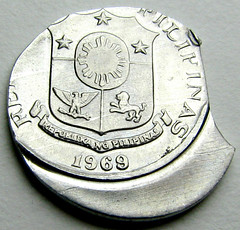
PREV ARTICLE
NEXT ARTICLE
FULL ISSUE
PREV FULL ISSUE
CONECA PUBLISHES THE MAY/JUNE 2015 ERRORSCOPE
Ken Potter forward a press release about the latest issue of Errorscope. Thanks! -Editor
The Combined Organizations Of Numismatic Error Collectors Of America, (CONECA) has just sent the May-June 2015 issue of its bimonthly journal, Errorscope, to press. Members will be receiving the color version online at the beginning of May, while the black and white hardcopy version will be in members’ mail boxes soon after.  
Errorscope editor, Jeff Ylitalo, showcases an array of Philippine Reform errors struck at U.S. Mint facilities. Featured are three Off Center strikes, including one with a large Curved Clip. His fourth coin is a Double Strike. He also includes images of pages from Domestic and Foreign Coins Manufactured by Mints of the United States 1793-1980, detailing a report from the Director of the Mint on Philippines’ coin production from 1967 through 1977. [CAMIRE][B2]](https://farm8.staticflickr.com/7604/16583100974_f7777c53dc_m.jpg) [CAMIRE][B2]](https://farm8.staticflickr.com/7692/17017802388_e3dd1f46c1_m.jpg)
Robert H. Knauss continues his series on Standing Liberty quarter errors and varieties by showing three different Multiple Errors, including the most spectacular entry, a 191X (full date not known) SLQ struck about 25% Off Center on an “origin unknown” nickel alloy planchet. Ken Potter reports on 1964-P&D, 1953-S and 1955-S Roosevelt dimes boasting Doubled Die Obverses with the most prominent area of doubling being Roosevelt’s lips. Potter nicknamed them “Hot Lips” – a reference he borrowed from the famous 1888-O “Hot Lips” Morgan dollar doubled die. Jon Sullivan reports on the Portland, OR, American Numismatic Association National Money Show detailing errors he saw and friends he met. He illustrates his article with a large number of error coins that were present plus images of many error-hobby personalities such as Fred Weinberg, Mike Ellis, Ken Hill and himself with his wife Ashton. Tom DeLorey writes about the discovery of a 1919 Winged Cap (Mercury) dime with a dramatic Doubled Die Obverse. In a news-flash, the editor also added in an image of the coin in an ANACS holder certified as VF-20. Jason Cuvelier writes about locating specific errors and varieties. It documents his search for a 1965 Lincoln cent with dramatic clashed die marks on both the obverse and reverse and a 1945 Lincoln cent exhibiting a moderately strong doubled die obverse showing best on the date and Liberty, and a tad on Lincoln’s ear. CONECA’s 20th/21st Century attributer of United States Die Varieties, James Wiles, shares a look at a few of the Doubled Dies and Repunched Mintmark varieties he’s listed in our files. Doubled Dies featured were all Lincoln cents including a 2009 “Log Cabin” Doubled Die Reverse, a 2013 Doubled Die Reverse and a 2014 Doubled Die Obverse. RPMs included two Lincoln cents dated 1938-D and 1945-S, a 1936-D Buffalo nickel and a 1912-S Barber dime. Al Raddi explains how to describe an Off Center struck coin with an Off Center Position Gauge, (handily sized for reader use) and describes a good way to estimate how far off center a coin is. The Member Finds column features a 1977 Mexican 100 Peso coin with a strong Doubled Die Obverse showing best on PLATA PURA 20 Gr. LEY 720 from Jeff Ylitalo and a 2000 Wide AM cent along with a No Date capped die strike from Pete Acampora. Potter visits Die Deterioration Doubling (DDD) explaining how hard it is for newer collectors to differentiate this form of doubling from true Doubled Dies and Repunching. He suggests that a look at many examples is often the best way to help understand the effect since it often varies from coin to coin depending on the design, era in which it is struck, planchet material and even the finish used on dies. One of the eight images that he shows depicts a 1943-S zinc-plated steel cent with strong DDD that Potter indicates is common that strong due to the wear and tear the dies had to withstand to strike steel planchets. Potter also explains that DDD is often very strong on Canadian and other countries’ coins that chromium-plate their dies for extended use. He illustrates this point with examples of DDD on a1962 Canadian cent and five-cent piece. Persons wanting to join CONECA should contact Rachel Irish at 3807 Belmont Rd., Coeur d' Alene, ID 83815 or by email at MRirish5@roadrunner.com. A copy of the application form may be download at http://conecaonline.org/content/join.html. Annual dues are as follows: Adult Member $25.00 per year, Young Numismatist (online Errorscope only) $7.50 per year or (online Errorscope plus mailed hard copy) $17.50. For Club and Family Memberships – ask Rachel or see the link above. CONECA members wishing to receive a login username and password to access Errorscope Online, Members Only area, please email the Membership Coordinator, Rachel Irish at the address listed above. A valid email address on file with CONECA is required for access to current and back issues of ErrorScope online. Wayne Homren, Editor The Numismatic Bibliomania Society is a non-profit organization promoting numismatic literature. See our web site at coinbooks.org. To submit items for publication in The E-Sylum, write to the Editor at this address: whomren@gmail.com To subscribe go to: https://my.binhost.com/lists/listinfo/esylum All Rights Reserved. NBS Home Page Contact the NBS webmaster 
|